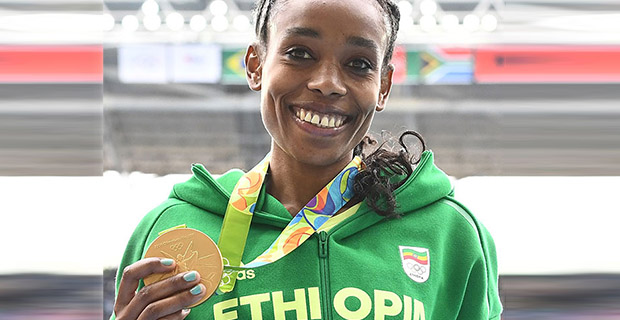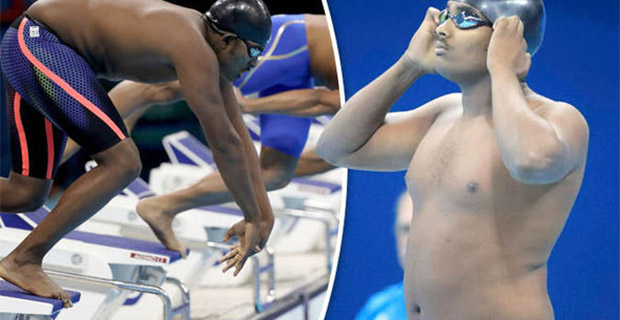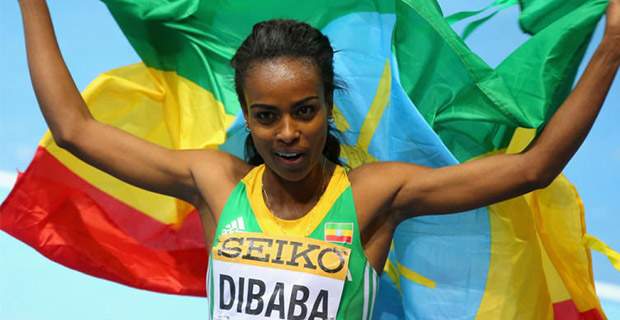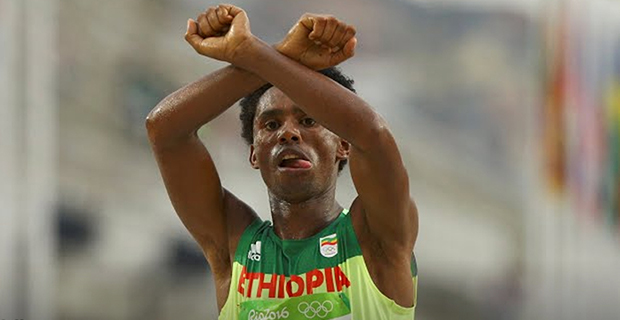Ethiopia’s campaign at the Rio 2016 Olympics had everything a thriller movie screen writer could dream of – underdogs, activists, record breaking performances, clouds of suspicion and maladministration. Elshadai Negash looks at the top seven talking points that emerged from the Games in Brazil.
The tale of two Almaz Ayanas
Rio 2016 showed us two Almaz Ayanas.
 The first is the all-conquering superstar, who produced a jaw-dropping 29:17.63 to break the world record in the women’s 10,000m final. This turned out to be Ethiopia’s only gold medal in a disappointing Olympic Games and a performance that took fourteen seconds off the previous world best. Its worth noting that two of the world’s top 10,000m performances of all-time before Almaz Ayana’s world record feat came through China’s Wang Junxia – an athlete who since her record in 1993 allegedly confessed to using performance-enhancing substances (PESs), and Turkey’s Ethiopian-born Elvan Abeylegesse, who has been banned for PESs retroactively seven years after her European-record performance at the 2008 Beijing Olympic Games.
The first is the all-conquering superstar, who produced a jaw-dropping 29:17.63 to break the world record in the women’s 10,000m final. This turned out to be Ethiopia’s only gold medal in a disappointing Olympic Games and a performance that took fourteen seconds off the previous world best. Its worth noting that two of the world’s top 10,000m performances of all-time before Almaz Ayana’s world record feat came through China’s Wang Junxia – an athlete who since her record in 1993 allegedly confessed to using performance-enhancing substances (PESs), and Turkey’s Ethiopian-born Elvan Abeylegesse, who has been banned for PESs retroactively seven years after her European-record performance at the 2008 Beijing Olympic Games.
The second is the big-race, tactically-naive Ayana, who ran out of gas and ideas in the middle of the women’s 5,000m final won by Kenya’s Vivian Cheruiyot. Having looked imperious in the 10,000m final when beating Cheruiyot and defending champion, Tirunesh Dibaba, Ayana gave away her lack of big championship experience by going all-out in the semi-finals before succumbing to Cheruiyot and her Kenyan compatriot, Helen Obiri. It was a major learning curve for Ayana, whose last defeat came in July 2015 and she will hopefully strategise better for major championship racing in the future.
Robel Kiros: Underprepared, Unfit and the Butt of Cruel Jokes
 While Lelisa became the symbol of resistance to many of his compatriots on social media, Olympic debutant swimmer Robel Kiros was on the receiving end of major bullying on the Internet.
While Lelisa became the symbol of resistance to many of his compatriots on social media, Olympic debutant swimmer Robel Kiros was on the receiving end of major bullying on the Internet.
The 24-year-old, representing a country with virtually no pedigree in swimming, finished 59th out of 59 qualifiers in the men’s 100m butterfly. He was so slow in his qualifying heat that the winner was preparing to exit the pool by the time he finished the race. For many outside of Ethiopia, his fighting performance was compared to the famous Eric “the eel” Musambani of Equatorial Guinea in the Sydney Olympics.
But the Internet can sometimes be a cruel place and Kiros felt its mean-spirited side when pictures of his unfit frame went viral. These were followed by details of alleged nepotism that led to his selection for the Rio Olympic Games and his nickname “Robel the Whale” quickly filled up cyberspace.
Shoeless Diro steals hearts of many
 It was a disappointing campaign for Ethiopia’s 3,000m steeplechasers in Rio. The three men failed to qualify from the heats, while Sofia Assefa, a medal favourite in the women’s race, could only finish a disappointing fifth. But her teammate, Etenesh Diro, stole the hearts of millions watching her first round heat with her against-the-odds performance. Running in the blistering early morning heat, Diro struggled with one of her shoes for a few laps before yanking it off, running the rest of the heats with a single pair.
It was a disappointing campaign for Ethiopia’s 3,000m steeplechasers in Rio. The three men failed to qualify from the heats, while Sofia Assefa, a medal favourite in the women’s race, could only finish a disappointing fifth. But her teammate, Etenesh Diro, stole the hearts of millions watching her first round heat with her against-the-odds performance. Running in the blistering early morning heat, Diro struggled with one of her shoes for a few laps before yanking it off, running the rest of the heats with a single pair.
Her brave efforts drew collective applause from the crowd and thousands on social media, as she limped to a seventh-place finish. She would receive a wildcard entry into the final and finish a lowly 15th, but her brave efforts endeared her to the hearts for millions around the world.
Silver Lining for Genzebe’s Summer of Madness
 As far as dramatic summers go, Genzebe Dibaba will have plenty of stories to tell her grandchildren when she reaches her later years. Her world unravelled on a quiet Monday morning in July, when Spanish police stormed into her hotel and arrested her award winning coach, Jama Aden, on suspicion of providing performance enhancing substances to his multinational group of athletes. Virtually every story published in the world’s media featured her name and her association with the Somali-born British coach, who took Genzebe from an underperforming 5,000m runner into a world champion and world record holder over the 1,500m in less than three years.
As far as dramatic summers go, Genzebe Dibaba will have plenty of stories to tell her grandchildren when she reaches her later years. Her world unravelled on a quiet Monday morning in July, when Spanish police stormed into her hotel and arrested her award winning coach, Jama Aden, on suspicion of providing performance enhancing substances to his multinational group of athletes. Virtually every story published in the world’s media featured her name and her association with the Somali-born British coach, who took Genzebe from an underperforming 5,000m runner into a world champion and world record holder over the 1,500m in less than three years.
Struggling with a foot problem the whole summer, Genzebe made a last ditch attempt to qualify for Rio and made easy work of storming into the final. But that was when she felt the full force of Aden’s absence (whose passport was confiscated in Spain, and was therefore unable to join her and the rest of his training group in Rio). A tactically-suspect Genzebe failed to run a race to her strengths and was outsmarted by Kenya’s tactically-astute Faith Kipyegon. Genzebe ended the race with a coveted silver medal – the first ever middle distance medal by an Ethiopian in Olympic history. Though she was left wandering what might have been had her world not unravelled on that Monday morning in a Spanish hotel.
Feyisa Lelisa: Lieutenant Turned Symbol of Resistance
 As far as Olympic marathon silver medallists go, Feyisa Lelisa will probably go down as the most famous in running history. Kenya’s Eliud Kipchoge ended any hopes of Lelisa becoming the first Ethiopian man to win Olympic marathon gold since Gezhagne Abera, at Sydney 2000, when he overtook him at the 38km mark and never looked back, stopping the clock at 2hrs, 8m and 03s
As far as Olympic marathon silver medallists go, Feyisa Lelisa will probably go down as the most famous in running history. Kenya’s Eliud Kipchoge ended any hopes of Lelisa becoming the first Ethiopian man to win Olympic marathon gold since Gezhagne Abera, at Sydney 2000, when he overtook him at the 38km mark and never looked back, stopping the clock at 2hrs, 8m and 03s
But Lelisa was not content with celebrating silver. The angry looking 26-year-old crossed his hands and put up an “X” sign as he approached the finish line to express his solidarity with ongoing protests in his country. He would later tell reporters – “If I return back to my country, they will kill me, put me in jail or keep me at the airport”.
He would subsequently not return to Addis Abeba with the rest of the Ethiopian Olympic team, as he prepares to seek asylum. Ethiopian-born athletes have sought asylum in the past and have even gone on to represent their adopted countries in competition, but they have rarely come out in support of movements at major sporting events. But none of them have captured the attention of the global media and have trended for days on social media like Feyisa Lelisa.
How do you stop Mo Farah?
Well, after Rio 2016, Ethiopian athletes don’t have a clue…. still!
First, Yigrem Demelash and Tamrat Tola tried to unsettle Farah by setting an uneven mid-race pace. Farah stumbled, hit the floor, but got up to overtake the duo at 200m and leading Kenyan Paul Tanui at 100m to defend his title. Tola beat Demelash for bronze, as Ethiopians were once again relegated to fighting for minor medals.
Six days later, Dejen Gebremeskel tried to ruffle Farah’s feathers in the men’s 5,000m final. But when Farah made his move, only compatriot, Hagos Gebrehiwet, and American, Paul Chelimo, were able to offer any kind of resistance. The Brit stayed the course; Chelimo followed him across the finish and Gebrehiwet added to his collection of minor medals from major championships (he has silver and bronze from the last two World Championship 5,000m finals).
The 32-year-old, Farah, who spends a significant part of his year training in Sululta on the outskirts of Addis Abeba, has now gone better than Miruts Yifter, Haile Gebrselassie and Kenenisa Bekele by winning the quadruple double (two World Championships and two Olympic double gold medals). Few can now doubt his place in the history books as one of the greatest distance runners of all time.
“Injera versus Ugali” no longer a contest of equals
Before every Olympic Games or World Championships, Kenya and Ethiopia enter the events with the hope of claiming bragging rights as the most successful African nation.
In Rio 2016, Ethiopia’s haul of 1 gold, 2 silver and 5 bronze was no match for Kenya’s record total of six gold, six silver and two bronze. Kenya’s expanded participation in events like the 400m hurdles, the Javelin, the decathlon and new sports, like Rugby Sevens and Taekwando, was a fresh wake up call to Ethiopians, who have long regarded their nation’s long distance focused participation as the solitary source of medals for Africans.






























